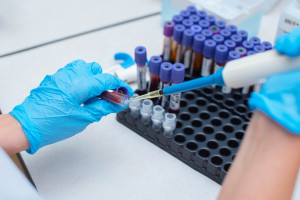15,000 people die from the disease every year. Most Poles don't even know they have it.

- Liver diseases, including HCV infection, remain asymptomatic for many years, and the first symptoms appear only in the advanced stage, which makes early diagnosis difficult.
- In Poland, approximately 15,000 people die from liver disease each year, with HCV infection accounting for the majority of hepatocellular carcinoma cases, which have a very poor prognosis.
- HCV can be cured in 99% of cases thanks to modern therapies, but screening tests are crucial, as the virus can be transmitted even through minor tissue disruptions, such as at the dentist or beautician.
- Experts recommend taking care of your liver by avoiding alcohol and cigarettes, engaging in regular physical activity, a healthy diet, and drinking coffee, as well as taking advantage of preventive screenings available through programs such as "Moje Zdrowie" (My Health).
Liver diseases can develop asymptomatically for many years, reminded Prof. Robert Flisiak, head of the Clinic of Infectious Diseases and Hepatology at the Medical University of Białystok, vice-president of the Polish Society of Epidemiologists and Infectious Disease Physicians, in an interview with PAP.
" Only when the changes are severe do symptoms appear that indicate the severity of the situation . Of course, liver disease can be detected in its early stages if appropriate laboratory tests are performed early enough," said the specialist.
He added that some of these tests were included in the package of the new preventive program "Moje Zdrowie", intended for people over 20 years of age.
"Imagine a large city where shops suddenly cease to operate, the municipal sewage company and the municipal transport company cease to operate, as do the transport companies that deliver goods from wholesalers to stores. Paralysis occurs. And this is exactly what happens in the body when basic liver functions are disrupted," said Professor Flisiak.
As he recalled, the liver simultaneously serves as a storage facility, accumulating reserves of proteins, carbohydrates, and lipids, transferring them to other organs as needed. It also performs a detoxification (i.e., cleansing) function , eliminating toxic substances from the body via bile into the digestive tract or converting them into safe chemical compounds that are then excreted through the kidneys.
"Albumin and other proteins responsible for transporting various substances and drugs between organs are produced almost exclusively in the liver. Additionally, albumin prevents fluids from escaping from blood vessels and cells into the intercellular spaces and body cavities, which can have fatal consequences. The liver also produces many other substances, such as clotting factors, without which the body would bleed to death at the slightest trauma," said Professor Flisiak.
15,000 people die in Poland every year from liver diseases such as cirrhosis or hepatocellular carcinoma.
"The problem is that a healthy liver isn't fashionable . We have a healthy heart, oncology research, and beautiful, slender bodies, but not a healthy liver," the specialist said.
He added that everyone has heard that you shouldn't overuse salt and that you should measure your blood pressure, but few people know that you should have liver tests (assessing the level of various liver enzymes) and a test for the HCV virus, which causes hepatitis C.
Consequences of chronic HCV infectionProfessor Małgorzata Pawłowska, head of the Department of Infectious Diseases and Hepatology at Nicolaus Copernicus University in Toruń, noted that the number of people infected with HCV in Poland is estimated at 145,000-150,000. However, infection has been detected in only a few percent of them.
"HCV infection is dangerous because it remains asymptomatic for many, many years, while simultaneously damaging the liver. If symptoms do occur, they are completely nonspecific, such as fatigue, drowsiness, and impaired concentration," the specialist explained.
She added that the consequences of chronic HCV infection are very serious - they include liver cirrhosis and hepatocellular carcinoma .
Professor Jaroszewicz pointed out that HCV infection is estimated to account for 60% of hepatocellular carcinoma cases in Poland. " It's a terrible cancer—90% of patients die within a year of diagnosis ," the specialist emphasized.
Prof. Pawłowska reminded that for 10 years, Poland has had access to highly effective and safe therapies for hepatitis C. Most – as many as 99% – patients with hepatitis C can be cured after 8 weeks, and a maximum of 12 weeks of therapy.
"Access to treatment is undoubtedly a success. Anyone infected with HCV who is identified and treated will recover," emphasized Barbara Pepke, president of the Gwiazda Nadziei Foundation.
However, it is necessary to actively search for HCV infection, as it remains asymptomatic for many years, noted Professor Pawłowska. She reminded everyone that, according to European recommendations and those of the Polish HCV Expert Group, an anti-HCV antibody test should be performed, as the virus can be transmitted to a person who has had a tissue disruption during medical procedures such as blood sampling or dental treatment, as well as during piercings, tattoos, or visits to a beautician or chiropodist.
- Everyone, even a young person, has had such a procedure performed at some point - for example, blood sampling or vaccination - explained Prof. Pawłowska.
According to Professor Flisiak, to identify and treat all HCV-infected individuals, it would be best to introduce screening tests in the 20-65 age group. To eliminate HCV infections by 2030 (the World Health Organization's goal) , approximately 3 million HCV tests should be performed annually in Poland. Currently, approximately 80,000 tests are performed annually by primary care physicians (PCPs).
An additional problem is that Poles don't ask for HCV testing from their primary care physician, Pepke said. She noted that the test costs only 30 PLN.
"Everyone thinks that if they haven't been in risky situations, for example, they haven't used drugs, then they won't be infected with HCV. No one associates tissue damage with a visit to a beautician or a dentist," she said.
Prof. Flisiak pointed out that a large percentage of hepatitis C patients who come to the centers unfortunately already have cirrhosis or even hepatocellular carcinoma. Worse still, these are often relatively young individuals, between the ages of 30 and 50.
Experts noted that HCV testing will be available as part of the new "Moje Zdrowie" (My Health) preventive program , intended for people over 20. The program is being implemented by primary care clinics. While these tests will not replace a mass HCV screening program, it is important that eligible individuals take advantage of this opportunity.
How to take care of your liver?Prof. Jaroszewicz emphasized that - in addition to testing for "liver enzymes" and HCV infection - the liver should be cared for in other ways.
- First of all, you should not smoke cigarettes, because smoking accelerates the development of liver diseases, and you should not abuse alcohol - no amount of alcohol is safe - the specialist emphasized.
The following are also crucial for maintaining a healthy liver:
- regular physical activity,
- a healthy diet (rich in vegetables, fruits, vegetable oils, omega 3 and omega 6 unsaturated fatty acids),
- drinking coffee regularly.
"We have very good data that coffee has a beneficial effect on liver function. Just three cups of coffee a day improve liver metabolism and support its detoxification functions," the expert concluded.
Copyrighted material - reprint rules are specified in the regulations .
rynekzdrowia











